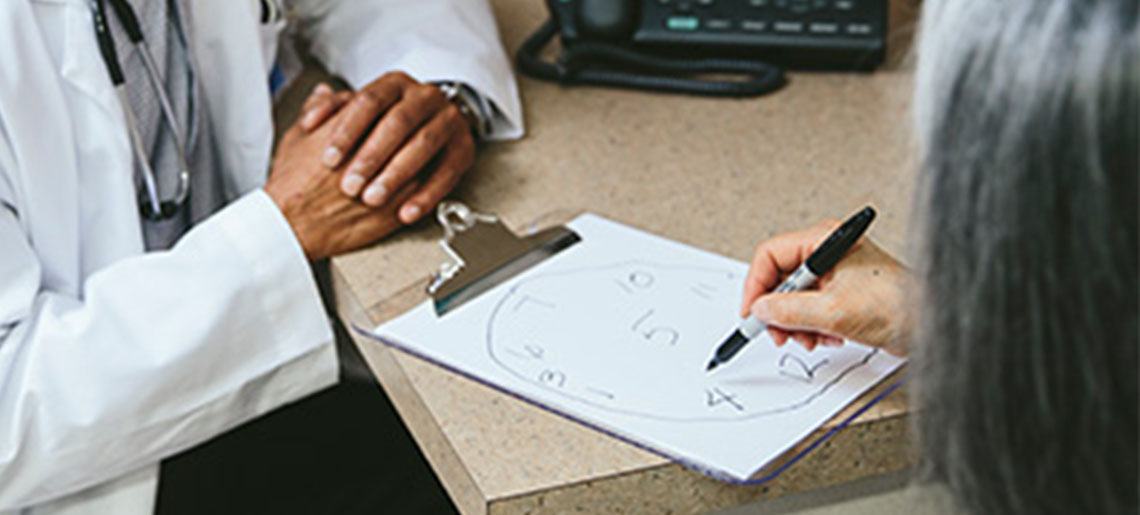Detection of dementia involves multiple tests and psychological assessments of elderly which take many things into consideration to help ensure an accurate diagnosis. These tests also help rule out other possible conditions and illnesses.
An accurate diagnosis of dementia is the most important first step to ensure you have appropriate treatment. Getting tested for dementia is a multilayered process and often involves interacting with multiple healthcare professionals such as a geriatrician, neurologist, psychologist and psychiatrist who carry out various evaluations.
Case History
The first step of an assessment is a detailed case history. During this process, the physician discussed the patient’s medical/psychiatric history, medication history, and gathers information about any other family medical history, changes in memory or personality. This helps to understand how the problems have developed and identify any other causes for concern.
Physical tests and laboratory examination
The symptoms of dementia can also be due to a number of other possible causes, such as vitamin deficiency, infection, thyroid and side effects from certain drugs. Some of the causes are often treatable so therefore, an early investigation is necessary to rule out these causes. Routine laboratory tests which are conducted are vitamin B12 deficiency, thyroid function, electrolyte balance, urine tests etc.
Neuropsychological tests
These tests are typically conducted by clinical psychologists or neuropsychologists who specialize in the measurement of cognitive function. Neuropsychological tests are done for memory screening for elderly. They are pen and paper tests that assess a number of mental abilities such as short term and long term memory, concentration, attention span, language skills, visual spatial ability and orientation.
The most common quick screener for dementia is the Mini Mental status examination (MMSE). This includes a brief set of questions to screen cognitive abilities, and usually takes about 5 minutes. It helps identify the presence of cognitive impairment and assess skills such as reading, writing, orientation and short-term memory. A detailed neuropsychological assessment involves a number of tests that are administered by a neuropsychologist. This is a very comprehensive evaluation and requires more time, including tests of attention, comprehension, memory, reasoning and visuospatial functioning.
Brain imaging techniques
Several brain-imaging methods are used to examine the brain changes and to rule out other conditions such as tumor, infarcts and to establish a baseline about the degree of degeneration.
- Computed tomography scan (CT scan) : This technique involves taking many X-rays from different angles in a short span of time. These images are then used to produce a 3-dimensional image of the brain. CT scans are mainly used to rule out other causes of dementia such as stroke, brain tumor or hemorrhage.
- Magnetic Resonance Imaging (MRI) : This technique uses powerful magnets and radio waves to produce detailed images of the brain which takes around 30 minutes to 2 hours. MRI helps in diagnosing the type of dementia. It shows the shrinkage in specific areas of the brain such as the frontal and temporal lobes are mainly affected by shrinkage in frontotemporal dementia and the blood vessel damage that happens in vascular dementia.
- Functional Magnetic Resonance Imaging (fMRI): This is a specialized form of MRI which measures the small changes in the blood flow in brain that occur with brain activity.
- Positron Emission Tomography (PET) & Single-Photon Emission Computerized Tomography (SPECT): In both of these tests, a small quantity of radioactive material is injected into the patient. PET provides visual images of activity in the brain and how the brain and its tissues are functioning. It helps doctors in recognizing the functional abnormalities early in the course of the ailment. SPECT is utilized to measure blood flow to different regions of the brain.
The findings from the various tests are reviewed and clinically corroborated by the physician before a diagnosis of dementia is made.
We at Samvedna Care have been working in Dementia Care since 2013. Our team of experts can help you with diagnosis and detection of Dementia, we provide cognitive assessments, psychiatric consultation and psychological assessments. We will provide you the best advice on dementia diagnosis so that you can provide good care for your loved one. Reach out to Samvedna Care for any queries on managing Dementia Care.

 +91 74280 97301
+91 74280 97301



